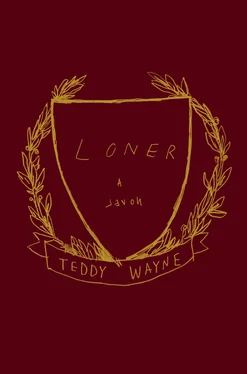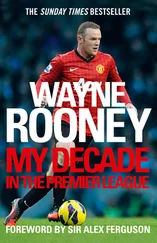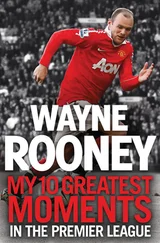Adamant Adam, Terrestrial Tejas, Shy Sara, the attention of the room revolving with the centrifugal force of a roulette ball that was inexplicably gaining momentum. After my physics-passionate roommate proudly declaimed “Subatomic Steven,” my mind went blank.
The room was still. Someone coughed.
As I tried to remember the words I had considered earlier, my internal dictionary scrubbed clean from czar to each , I heard, from the floor to my left, “Genius Jake.” The others laughed in appreciation.
“We forgot David,” Steven yelled.
All eyes reverted to me — yours included, I imagine.
“David,” I squeaked. My brain harped on the word vaginal .
“Defiant,” I said.
I was the only one to state my name before its alphabetical pairing — a small act of defiance itself, it occurred to me. I’d begun faultily but had recovered with verve, the gymnast sticking his landing after a herky-jerky dismount. I wondered if anyone else had taken note of my subversive maneuver.
“Funky-fresh Phil,” said Jake’s teammate as the room again buckled in laughter. The line approached you.
“Veronica,” you said in your voice with nothing to prove, so unlike my own timorous quaver. Then, with the minutest upturning of the left side of your lip, “ Veritas .”
You were the only person who had followed my lead. Kindred spirits of swapped syntax. And, from that curling lip, there was some mischief to your appropriation of our college’s motto of truth.
Other names and parts of speech skittered around as the game continued, but I heard only the two words you had spoken. Had you gone standard as everyone else had— Vivacious Veronica —it’s possible that you would not have lassoed my imagination so completely, that I might have feasted on your superficial appeal over the course of that meeting and decided I was sated. Yet that Latin addition meant you had more than beauty in your arsenal. You possessed creativity and wit and, as your dismissal of jockstrap Jake and feeble-minded Phil had suggested, valued intelligence and sensitivity.
Veritas : someone like me had a shot. We were, after all, really at Harvard.
When the meeting concluded Steven drafted me into a six-person troupe he had formed in the scrum of the common room. We trundled over for dinner to Annenberg Hall, that cathedral-like space splashed across the brochures and websites, where glowing, ethnically diverse faces rounded out every photo. I’d seen it during my campus visit with my father a year earlier, but tonight I was no longer a mere spectator of its burnished walnut paneling, stained-glass windows, and chandeliers; I was standing in the brochure itself, ready for my close-up.
I brought my tray over to the table Steven had secured. As was my New Jersey set, they were a visual hodgepodge, a chimera of the shambling (Justin) and the husky (Kevin) and the ectomorphic (Steven), the overdressed (Carla looked like she was on her way to a college interview) and the flamboyantly unfashionable (Ivana and her shoe gloves), topped off by an aggressively nondescript seat filler (Sara, who had gravitated to us).
Sara patted the empty chair next to her. “Saved you a seat,” she said.
Though an upgrade over my Hobart High lunch club — three girls! — we were still clearly freshmen who had missed out on the normal high school experience and were now attempting to simulate it in college. Our dinner conversation revolved around the cuisine, the refuge of those with little in common. We lobbed insults at the sogginess of the tater tots. We mocked the desiccation of the halal grilled chicken. We speculated about breakfast. Everyone responded to each joke like soused nightclub patrons yukking it up as a legendary comedian trotted out his greatest hits.
I forced myself to smile along, but felt a spasm of apprehension seeing the next few months unfolding much like this, the ripe cranberry blush of autumn fading to bleached December. By cruel accident, these might well become my college friends. We would choose to live together as upperclassmen, visit one another on vacations, stay in touch after graduation, attend the other members’ nuptials — maybe two of us would even get married. We would rate the hors d’oeuvres at the wedding reception and ponder what brunch would be.
My cowardly instinct was to cling to them. But not for too long: powerful clans are never this diverse and scattered. Only the outcast are.
I got up to scoop myself a bowl of sugary cereal amid the symphony of fork tines scraping white ceramic plates, wending past tables populated by students who appeared to have happily found their tribes: girls with chemically blond hair; an octet of preppy black students; football behemoths with phalanxes of neon sports drinks; chicly dressed Asians; outdoorsy types toting bumper-stickered Nalgene bottles; future Undergraduate Council presidents and their cabinet members; legacy WASPs with Roman numerals appended to their names and swoops of hair soldered to their foreheads.
When I sat back down, there you were at last, coming into the dining hall late.
You stood in the roped-off line near my table among the clutch of students you’d arrived with, engaged in a whispery tête-à-tête with another girl, already having things worth saying in confidence. The rest of your group possessed a similar ease, as though they’d hung out together for years. A uniformity of physical desirability differentiated by grace notes: that girl’s raven tresses and alabaster skin against your coppery tones, that boy’s cultivated stubble, the one black guy wearing a gauzy scarf in August. I watched them — you, really — in slow motion, cinematographer of the hackneyed movie sequence in which the cafeteria’s din silences and a languorous song spills in as your moving lips swallow up the frame.
I could tell that you all had not only gone through high school as one should but had done so precociously in seventh and eighth grades; your secondary education had featured the unfettered experimentation typically associated with college; and now you were, compared with the rest of us, bona fide adults.
One other thing was obvious, from your clothes, your body language, the impervious confidence you projected, as if any affront would bounce off you like a battleship deflecting a BB pellet: you came from money.
My parents made good salaries practicing law, but nothing close to the assets of your families, where a crack about tuition and parking would never even come to mind, let alone be verbalized. Yet your crowd didn’t reveal its class by stock emblems of affluence: navy blazers with brass buttons and chinos, pearl necklaces, the plumage of those crimson-and-blue-blooded WASPs who looked like they’d been born wearing a pair of boat shoes. Yours was subtler and pitted against that bloated, decaying archetype. You had traveled widely, dined at Michelin-starred restaurants without parental supervision, matriculated at schools with single-name national reputations, ingested designer drugs and maybe had a cushy stint in rehab.
It wasn’t just your financial capital that set you apart; it was your worldliness, your taste, your social capital. What my respectable, professional parents had deprived me of by their conventional ambitions and absence of imagination.
I’d done everything I was supposed to my whole life, played by all the rules. It had gotten me into Harvard, but look where I was sitting: with Subatomic Steven and the rest of our lost-and-found bin.
As I hovered over my bowl of Lucky Charms with soy milk, your conversation with the girl concluded. You took an eyedropper out of your pocket, reclined your head, and squeezed a couple of times into both sides. Then you closed your eyes and massaged the corners, as if the public world were too pedestrian to bear witness to and necessitated a retreat into your private one. You blinked several times, your eyes glassy with artificial tears, and stared off into space. It seemed like we were the only two people in the cacophonous dining hall not speaking to anyone, the only two not fully present.
Читать дальше












